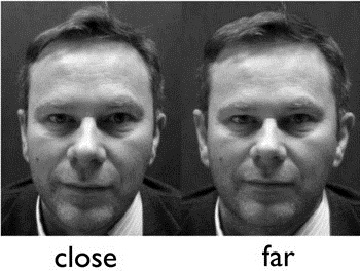Close-Up Photos Make You Look Bad

A close-up picture slightly distorts the details of your face, and those subtle changes might make you look less attractive and less trustworthy to others, a new study suggests.
In several experiments, researchers from the California Institute of Technology (Caltech) asked study participants to judge 36 photographs showing two different images of 18 individuals. One image in each pair was taken at a close range of about 2 feet (0.6 meters) and the second was shot from a distance of about 7 feet (2.1 m).
The researchers chose these two distances because one is within, and the other outside of, the traditional boundaries of personal space. In order to see the effect of the closer range, and not other associated factors, the researchers made sure the faces in each set showed the same expression and appeared to be the same size.
"Of course, the close picture would also normally be larger, higher resolution and have different lighting — but we controlled for all of that in our study," study researcher Ronnie Bryan said in a statement. "What you're left with is a warping effect that is so subtle that nobody in our study actually noticed it. Nonetheless, it's a perceptual clue that influenced their judgments."
As viewing distance decreases, the face's nose looks relatively larger and the ears smaller, the researchers said.
The study participants judged the subjects of the subtly warped close-up portraits as less trustworthy, less attractive and less competent, the researchers found.
"This was a surprising, and surprisingly reliable, effect," Caltech neuroscientist Ralph Adolphs said in a statement. "We went through a bunch of experiments, some testing people in the lab, and some even over the Internet; we asked participants to rate trustworthiness of faces, and in some experiments we asked them to invest real money in unfamiliar people whose faces they saw as a direct measure of how much they trusted them."
Sign up for the Live Science daily newsletter now
Get the world’s most fascinating discoveries delivered straight to your inbox.
The finding held even after accounting for face width-to-height ratio, as studies have shown wide faces in men are linked with aggression, unethical behavior and perceptions of untrustworthiness.
Rather, the researchers suspect the effect has to do with personal space and the related social cues. Various studies have shown that interpersonal distance, whether someone is within or outside of your personal space, can impact social behaviors. Even more, the distance has been related to activity in certain brain structures, including the amygdala — a structure linked to evaluation of threat and even trustworthiness of faces.
The study appears this week in the journal PLoS One.
Follow LiveScience on Twitter @livescience. We're also on Facebook & Google+.










